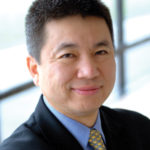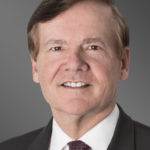Many members of the medical community say it is possible to have too much of a good thing. Across all specialties, clinicians and researchers alike suffer from what some call “analysis paralysis” or “big data overload.”

“We have an extraordinary amount of knowledge and an extraordinary amount of data, but we don’t have the insight from our systems of record to effectively put that data to work for us,” said Kyu Rhee, MD, MPP, Chief Health Officer at IBM, where he oversees Watson Health. “In fact, technology, in some ways, has impaired our ability to have what we fundamentally want, which is strong, trusting relationships with our patients.”
Dr. Rhee, who spoke with the Daily News before this year’s meeting, had to cancel his appearance at the Annual Meeting to present the clinical symposium Solving Problems in Rheumatology & CognitiveScience, but Tina Moen, PharmD, Deputy Chief Health Officer, IBM Watson Health, will take his place and will discuss how augmented intelligence and cognitive science can help the medical community overcome the profession’s big data crisis.
The session, one of three featured TechMed sub-track sessions on Tuesday, will take place from 11:00 am – 12:00 pm in Room 20 A.
Dr. Rhee believes tools such as Watson Health offer extraordinary potential, promise, and opportunity.
“We believe augmented intelligence — what some call artificial intelligence — will soon be a part of every decision all stakeholders in medicine will use,” Dr. Rhee said. “If you look at the role of the electronic medical record, it hasn’t necessarily, at a population level, improved health outcomes or made things more efficient. Now there is an opportunity with cognitive systems, with augmented intelligence, to bridge that big data gap that has existed between data, knowledge, and insight. This is relevant to the provider, to the patient, to the payer, to the policy makers — to all the key stakeholders in healthcare.”
During the session, Moen will share examples of how this technology is already being used to turn extensive data into usable insights to predict glucose fluctuations and thus prevent episodes of hypoglycemia and hyperglycemia. She will demonstrate how cognitive systems can bring insights out of big data and also discuss how cognitive systems can apply to rheumatology.
“There are a lot of challenges in rheumatology — therapy choices, medication adherence, physical activity, and other lifestyle choices or behavior,” Dr. Rhee said. “There are many ways we can leverage technology to help providers make more informed decisions and deliver better care to patients with rheumatologic diseases.”
Technology & Medical Education
Modern technology can also be put to use to improve student engagement and enhance medical education curricula. During the clinical symposium E-Learning Methods & Educational Technology inRheumatology Education beginning at 8:30 am on Tuesday in Room 23 A, one expert will discuss how a trend in “flipped” classrooms can benefit medical education and the role technology can play in successfully implementing the practice.

Kristen Hayward, MD, MS, Co-chair of the Foundations, Immunology, and Microbiology course at the University of Washington School of Medicine, will present “Applying a Flipped Classroom Instructional Model to an Intensive Rheumatology Curriculum for Second-Year Medical Students.”
“My talk fits into a broader discussion about education and technology,” Dr. Hayward said. “My first goal will be to explain the concepts of active learning and learner engagement. If you’re interested in your teaching — whether it’s teaching patients or students — having more impact, if you’re thinking about engagement, technology can be an important tool to that end.”
Dr. Hayward will review the flipped classroom design, where class time is used for higher level synthesis, engagement with the instructor or classmates, and application of information.
Dr. Hayward will discuss things like audience-response systems and how technology can be used to replicate and disseminate curricula across satellite campuses, something that has been done successfully at the University of Washington.
While this does not have anything to do with technology directly, Dr. Hayward said, technology can make implementing a flipped classroom easier and more feasible.
“I think the take-home message is that technology is great,” she said. “It’s fun. There are a wide variety of ways to use it in a flipped classroom — from inexpensive, low-tech methods to really high-tech methods. So there’s something for everyone regardless of budget.”
Advocacy in the Social Media Era
Beyond the practice of medicine and the education of future clinicians, advocacy efforts in the medical profession are also evolving as technology evolves. The rise of social media, in particular, has brought about great change in the way organizations such as the ACR interact with Congress.

Former U.S. Sen. Tim Hutchinson, R-Arkansas, will discuss how to continue to advocate successfully in the social media era during a clinical symposium from 9:00 – 10:00 am Tuesday in Room 5 B.
During Intro to Advocacy: First Steps, Social Media & Technology talk, Hutchinson, who is Senior Director of the Greenberg Traurig law firm in Washington, D.C., will review what the past year has meant for healthcare and health policy in the United States at the state and federal levels, and how clinicians can effectively advocate in the current environment.
“The election of President Trump has demonstrated the power of social media,” Hutchinson said. “We will explore how advocates for healthcare issues can use social media positively and effectively. “
Concerns about terrorism and cyber security have created challenges in communicating with Congress today that didn’t exist 20 years ago. Hutchinson will give some suggestions for overcoming those challenges.
Hutchinson also will discuss the advantages of being part of an association such as the ACR.
“An individual can still make a difference, but there are real advantages to collective advocacy like the efforts put forth by the American College of Rheumatology,” he said. “I’ll be using the College’s success throughout the years to illustrate how we can engage in effective advocacy. There will also be lessons from the times we haven’t been successful.”
